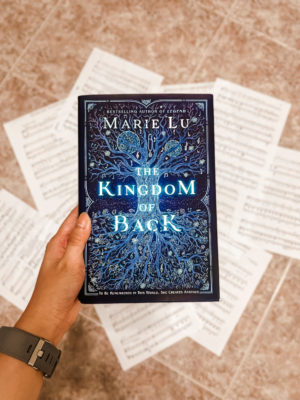
Review: The Kingdom of Back by Marie Lu
Title: The Kingdom of Back
Author: Marie Lu
Format: Hardcover
Pages: 336
Genre: Fantasy
Book 20 of 2021
Reading Time: 3hrs 50mins
Date Finished: July 31, 2021
Content Warnings: Childhood illness, sexism, emotional manipulation, coercion
What Worked For Me: Setting, music history, main character
What Didn’t Work For Me: Slow middle, moments of extreme childishness
☆☆☆☆☆ 4.5/5
Pretty much anything Marie Lu writes will be added to my shelves. I’ve been following her career since Champion came out, and it was through her books that I first saw how an Asian character could not only be a love interest, but be the main character. For years, her books have been a way for me to see myself represented on the pages. She was also the first mainstream Chinese-American author I saw gain success in publishing, which gave me hope that I could break into mainstream publishing as a Singaporean-Chinese writer. So when she announced a standalone fantasy book about Mozart’s widely unknown but equally talented sister, I knew I had to pick this up.
What drew me to this book so much was that it focused on Marianne Mozart, more commonly known as Nannerl to her family. I had heard about her once from a “fun fact” series about classical musicians, so I knew that Mozart had a sister who also played the piano. What I didn’t know was that she was equally matched, if not more talented than her brother. And the reason we don’t hear of her is because women weren’t allowed to have a successful music career back then. As a result, there is no record of anything she’s ever written even though she composed just as much as Wolfgang did.
From the moment I started reading, I was drawn in. Lu’s typical writing style had been switched out for something lyrical that matched the musical nature of the story. Typically, I’m not a fan of lyrical writing, but this was different. It felt like listening to music, felt like going over lyrics that told a story. Getting into the story was easy. Thought it took me awhile to get through this as I was transitioning between hotel quarantine and learning to live in Singapore, picking up the book felt like no time had passed.
In many ways, I think that I love this book for the same reasons I love The Invisible Life of Addie LaRue. Both feature a woman so desperate to make a name and future for herself in a world made for men, so willing to give up what they have for the chance at something more, trying to do everything they can to be remembered. It hits close to home for me. I know what it’s like to fear that my name will be erased by history, to never make a mark on the world. Knowing that on this side of history, Nannerl Mozart’s work has either been lost or released under her brother’s name, it’s like watching what could happen to me if I never managed to leave part of myself here after I’ve passed on. And it terrifies me to think that I might not leave a legacy of work for people to remember me by.
The concept of this book, featuring a magical kingdom known only to the Mozart children, is a real thing that Wolfgang and Nannerl used to pass the time on long carriage rides between performances. So much of this is rooted in historical fact, giving the richness of the setting even more depth. The Kingdom of Back existed in the minds of the Mozart children, and now it’s alive again in this book.
I appreciated the direction this book went in, how it played out differently than what I initially expected. I loved learning about the routes the Mozart family took as they performed all over Europe, how close the Mozart children were. Though I’ve never been particularly interested in the history of music, I had a great time learning about this family and how the children composed so much at such a young age.
If anything, my only real complaint is that Wolfgang was portrayed to be quite childish and immature no matter how old he got. Whereas Nannerl was forced to grow up and be the older sister ready for marriage, he was allowed to be a child and act however he wanted because the world knew him as the musical prodigy. I would have liked to see him grow up more as the book progressed, but he felt largely the same despite the passage of time.
This is the kind of book I’d recommend to anyone who grew up playing the piano (aka every Chinese child ever), who enjoyed The Invisible Life of Addie LaRue, or who want to read about the life of musician that history forgot. I know I’ll be remembering her from now on.
